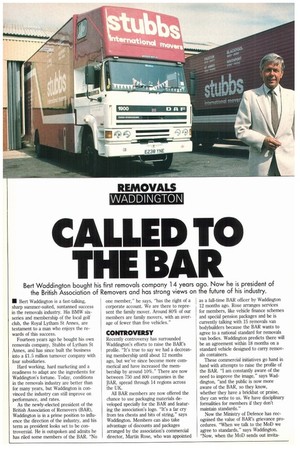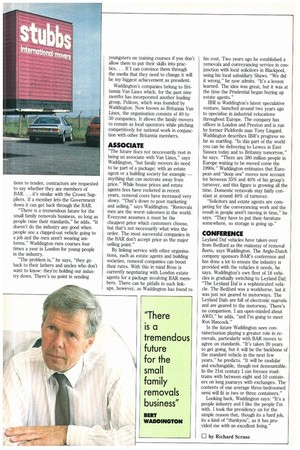CALLED TO THE BAR
Page 50

Page 51

If you've noticed an error in this article please click here to report it so we can fix it.
Bert Waddington bought his first removals company 14 years ago. Now he is president of the British Association of Removers and has strong views on the future of his industry.
11 Bert Waddington is a fast-talking, sharp summer-suited, suntanned success in the removals industry. His BMW sixseries and membership of the local golf club, the Royal Lytham St Annes, are testament to a man who enjoys the rewards of this success.
Fourteen years ago he bought his own removals company, Stubbs of Lytham St Annes, and has since built the business into a £1.5 million turnover company with four subsidiaries.
Hard working, hard marketing and a readiness to adapt are the ingredients for Waddington's fortune. Today, conditions in the removals industry are better than for many years, but Waddington is convinced the industry can still improve on performance, and rates.
As the newly-elected president of the British Association of Removers (BAR), Waddington is in a prime position to influence the direction of the industry, and his term as president looks set to be controversial. He is outspoken and admits he has riled some members of the BAR. "No one member," he says, "has the right of a corporate account. We are there to represent the family mover. Around 80% of our members are family movers, with an average of fewer than five vehicles."
CONTROVERSY
Recently controversy has surrounded Waddington's efforts to raise the BAR's profile. "It's true to say we had a decreasing membership until about 12 months ago, but we've since become more commerical and have increased the membership by around 10%." There are now between 750 and 800 companies in the BAR, spread through 14 regions across the UK.
All BAR members are now offered the chance to use packaging materials developed specially for the BAR and featuring the association's logo. "It's a far cry from tea chests and bits of string," says Waddington. Members can also take advantage of discounts and packages arranged by the association's commercial director, Martin Rose, who was appointed as a full-time BAR officer by Waddington 12 months ago. Rose arranges services for members, like vehicle finance schemes and special pension packages and he is currently talking with 15 removals van bodybuilders because the BAR wants to agree to a national standard for removals van bodies. Waddington predicts there will be an agreement within 18 months on a standard vehicle designed to carry removals containers.
These commercial initiatives go hand in hand with attempts to raise the profile of the BAR. "I am constantly aware of the need to improve the image," says Waddington, "and the public is now more aware of the BAR, so they know, whether they have a brickbat or praise, they can write to us. We have disciplinary formalities for members if they don't maintain standards."
Now the Ministry of Defence has recognised the value of BAR's grievance procedures. "When we talk to the MoD we agree to standards," says Waddington. "Now, when the MoD sends out invita tions to tender, contractors are requested to say whether they are members of BAR. , . it's similar with the Crown Suppliers. If a member lets the Government down it can get back through the BAR.
"There is a tremendous future for the small family removals business, so long as people raise their standards," he adds. "It doesn't do the industry any good when people see a clapped-out vehicle going to a job and the men aren't wearing uniforms," Waddington runs courses four times a year in London for young people in the industry.
"The problem is," he says, "they go back to their fathers and uncles who don't want to know: they're holding our industry down. There's no point in sending youngsters on training courses if you don't allow them to put their skills into practice. . . If I can convince them through the media that they need to change it will be my biggest achievement as president.
Waddington's companies belong to Britannia Van Lines which, for the past nine months has incorporated another loading group, Pelicon, which was founded by Waddington. Now known as Britannia Van Lines, the organisation consists of 40 to 50 companies. It allows the family movers to remain as local operators while pitching competitively for national work in conjunction with other Britannia members.
ASSOCIATE
"The future does not neccessarily rest in being an associate with Van Lines," says Waddington, "but family movers do need to be part of a package; with an estate agent or a building society for example — anything that can motivate away from price." While house prices and estate agents fees have rocketed in recent years, removal costs have increased very slowy. "That's down to poor marketing and selling," says Waddington. "Removals men are the worst salesmen in the world. Everyone assumes it must be the cheapest price which customers choose, but that's not necessarily what wins the order. The most successful companies in the BAR don't accept price as the major selling point."
By linking service with other organisations, such as estate agents and building societies, removal companies can boost their rates. With this in mind Rose is currently negotiating with London estate agents for a package involving BAR members. There can be pitfalls in such linkups, however, as Waddington has found to his cost. Two years ago he established a removals and conveyancing service in conjunction with local solicitors in Blackpool, using his local subsidiary Shaws. "We did it wrong," he now admits. "It's a lesson learned. The idea was great, but it was at the time the Prudential began buying up estate agents."
IBR is Waddington's latest speculative venture, launched around two years ago to specialise in industrial relocations throughout Europe. The company has offices in London and Preston and is run by former Pickfords man Tony Lingard. Waddington describes IBR's progress so far as startling. "In this part of the world you can be delivering to Lewes in East Sussex today and to Britanny tomorrow," he says. "There are 380 million people in Europe waiting to be moved come the 1990s." Waddington estimates that European and "deep sea" moves now account for between 35% and 40% of his group's turnover, and this figure is growing all the time. Domestic removals stay fairly constant at around 40% of turnover.
"Solicitors and estate agents are competing for the conveyancing work and the result is people aren't moving in time," he says. "They have to put their furniture somewhere, so storage is going up."
CONFERENCE
Leyland Daf vehicles have taken over from Bedford as the mainstay of removal fleets, says Waddington. The Anglo-Dutch company sponsors BAR's conference and has done a lot to ensure the industry is provided with the vehicles it needs, he says. Waddington's own fleet of 18 vehicles is gradually switching to Leyland Daf: "The Leyland Daf is a sophisticated vehicle. The Bedford was a workhorse, but it was just not geared to motorways. The Leyland Dais are full of electronic marvels and are geared to the motorway. There's no comparison. I am open-minded about AWD," he adds, "and I'm going to meet Ron Hancock."
In the future Waddington sees containerisation playing a greater role in removals, particularly with BAR moves to agree on standards. "It's taken 20 years to get going, but it will be the backbone of the standard vehicle in the next few years," he predicts. "It will be modular and exchangable, though not demountable. ln the 21st century I can foresee roadtrains with between eight and 10 containers on long journeys with exchanges. The contents of one average three-bedroomed semi will fit in two or three containers."
Looking back, Waddington says: "It's a people industry and I like the people I'm with, I took the presidency on for the simple reason that, though its a hard job, its a kind of "thankyou", as it has provided me with an excellent living."
































































































